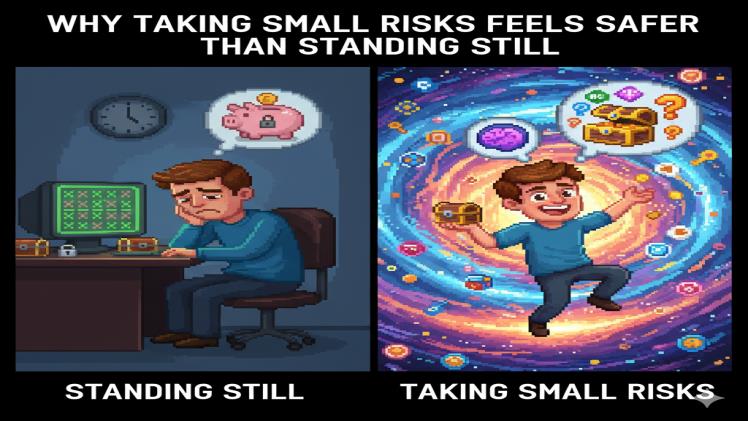Why Taking Small Risks Feels Safer Than Standing Still
Updated: 25 Oct 2025
9

Ever wanted to go on and start a game online, then feel strangely soothed by clicking a Spin button, or unintentionally nervous by doing absolutely nothing? The human being has an inquisitive connection with risk. Small, contented dangers are usually safer than stagnation, which runs counter to intuition.
The Paradox of Motion and Safety.
We believe that safety is doing nothing. However, inaction is often perceived as a latent threat to the human brain. Remaining in a state of indecision paralyses us, and although taking minimal actions, such as visiting a new option on Dragon Slots Argentina or testing a minor adjustment to a strategy in a game, makes us feel we are moving forward and in control.
These are the micro-decisions which anchor our minds. It is not about the magnitude of the risk, but rather a decision regarding the risk. Even in making a decision, one is relieved of the mental strain of inertia.
Small Risk: Why Small Risks Satisfy the Brain.
The Illusion of Control
Human beings like to think that they can manipulate events. When you make a tiny, conscious decision, such as deciding to use a casino registration bonus spin or some minor upgrade, you will feel like a small puppeteer of destiny. This feeling of power leads to latent gratification, though the actual outcome cannot be fully known. These small gambles are safe because of cognitive biases, such as the tendency to inflate our influence.
The Dopamine Loop
Whenever we encounter any micro-risk, the dopamine loop in our brain becomes activated. It is the same chemical gratification that makes an unexpected call to your cell phone so satisfying. Even small victories, even symbolic ones, will give you an immediate reward and a slight push that will inform your brain, Hey, you’re doing fine here. Variable rewards, such as those scattered across digital domains, are especially useful for sustaining this loop.
Comfort in Progress
Motion is a psychological sign of security. A supernatural evolution prepares us to prefer action to inaction — action, exploration, experimentation — how little, the more we indulge in it, the more we feel in control. Small risks serve as a kind of emotional inertia: every decision is micro-evidence that we are interacting with life, even in a virtual world.
Neuroscience of Perceived Safety.
Amygdala vs. Prefrontal Cortex
Prefrontal equilibrium pacifies the fear reaction. Practically speaking, turning a slot or testing a new application feature is usually more soothing than aimlessly scrolling in an endless loop.
Dopamine and Anticipation
We also tend to love anticipation more than the outcome. That is why digital experiences, such as well-designed spaces like Dragon Slots Argentina, may be safe despite being risky in their own way. The expectation of a minor reward conditions dopamine circuits and maintains engagement.
Predictable Uncertainty
Man loves to be predictable–but he cannot stand any complete predictability. Small, computed risks are the happy medium: partial uncertainty is enough to keep the mind on the alert, but the systematic environment makes us not feel helpless. This equilibrium explains why some online platforms and game mechanics feel psychologically secure, even though they provide a thrill.
Digital Behaviour: A Schoolyard of Little Betas.
Digital environments are actually developed in micro-risk experiences: gamification, immediate rewards, and progress tracking leverage inherent human behaviours. Examples include asserting a mini-in-game reward or testing a new functionality, which constitute a low-stakes gamble.
Micro-Risk Design
Variable rewards are deliberately designed into apps and platforms. Consider badges, mini wins or spin bonuses. The interaction is a mini-decision that fulfils curiosity and lowers decision fatigue. This is similar to the dopamine-based loop in more recognisable games, even in games that are not part of traditional gambling.
Formalized Interaction with Dragon Slots Argentina.
Dragon Slots Argentina demonstrates the potential of a well-organised digital platform that can offer low-stakes, safe, and harmless play. Users explore foreseeable probabilities, immediate feedback, and discretionary bonuses —all of which enable low-stakes experimentation with no devastating effects.
Digital Choice Emotional Regulation.
Risk management is not merely entertaining — it is curative. Using a small bet or experimenting with something online helps control emotions, eliminate boredom, and maintain interest. Small digital risks, in other words, are miniature exercises in agency that keep the mind and mood active.
Expert Assessment
Both behavioural economists and neuropsychologists agree that humans evolved to pursue challenges they can handle. Ironically, excessive safety increases stress. Micro-risk behaviour, in digital gaming or real-life decision-making, makes use of this instinct in a way that is both interesting and psychologically reinforcing. Structured feedback and predictable outlines foster controlled risk-taking, allowing exploration without threatening emotional balance.
Please Write Your Comments